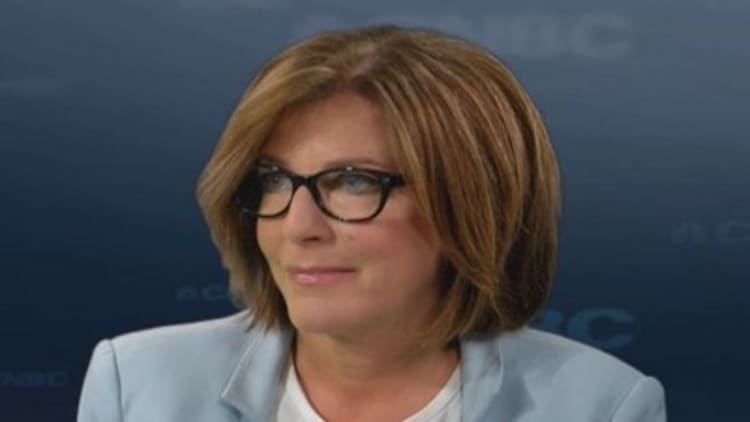
Fed hawks and doves have a lot more in common than they used to—an improving labor market.
But what the hawks and doves still disagree on, however, is how much labor is improving and how central bank policy should respond. That was apparent in comments Thursday from two Fed presidents, both appearing on CNBC from the Kansas City Fed's annual symposium in Jackson Hole, Wyoming.
Comments from hawkish Kansas City Fed President Esther George and dovish San Francisco Fed President John Williams highlight the tension within the Fed over how good the job market really is and how much policy is needed to sustain and nurture it.
The Fed, for the first time Wednesday, highlighted in its July meeting minutes that its members were surprised by the improving job market. The economy has added more than 200,000 jobs in each of the last six months, and the unemployment rate, at 6.2 percent, is close to the Fed's projected rate of 6 to 6.1 percent by year-end.
The minutes were seen as hawkish and that now puts an even brighter spotlight on Fed Chair Janet Yellen's Jackson Hole speech Friday. She is expected to discuss labor slack and her concerns about continued weakness in the labor market.
But Fed officials Thursday sounded fairly upbeat on employment.
"We've seen broad-based improvements in the labor market, this year in particular," said Kansas City's George. She is a hawk who dissented against dovish policy when she had voting powers last year. "We are beginning to see the long-term unemployed come back as the labor market improves."
Read MoreFed's George: Investors too complacent on rates
And dovish Williams agrees, "We're seeing improvement broadly across a lot of categories of the labor market, and one thing I will mention is the long-term unemployment rate is coming down too, and that's a really positive sign for the labor market."
Read MoreFed's Williams: Summer rate hike 'reasonable'
But that's where agreement ends. George thinks the Fed should be discussing moving to normalization in rates now, but Williams doesn't expect a rate hike until the middle of next year and he sees a lack of wage inflation as a sign of continued labor slack.
Yellen has made it clear the Fed needs to maintain easy policy to address the concerns of long-term unemployment and a low labor market participation rate.
"They agree on the facts. They just don't agree on the policy response to the facts. Maybe it's a matter of degree," said Moody's Analytics Chief Economist Mark Zandi.
He said he doesn't see much change in the divide between hawks and doves, and he expects the first rate hike to come in the middle of next year, in line with consensus.
Fed watchers read the July minutes as more hawkish since the central bank also discussed the idea of moving rate hikes forward. Williams stressed that his view on the timing of rate increases could change depending on the performance of the economy, either better or worse. George, on the other hand, said the Fed should be discussing normalization now, based on improvements in the economy.
"It's clearly moving in a more hawkish direction, however incremental that may be. ... The Fed's rhetoric is shifting, and not just from the most hawkish members," said Dan Greenhaus, chief global strategist at BTIG. But things have not changed enough to force the Fed to act, and Yellen should continue to sound dovish. "I don't think you'll get any indication of them shifting market expectations."
As for the message from Jackson Hole? "A lot depends on Yellen's tone. She might push back on some of the hawkishness, and at the same time she might embrace it," Greenhaus said.
Read MoreCNBC Survey: Wall Street expects really dovish Fed on interest rates
Zandi said the Fed's hawkish tones should just get louder. "They're going to stick to their script. As they approach this time next year, they're going to have to increasingly become more hawkish. I don't sense that their language has changed that much," he said.
—By CNBC's Patti Domm


